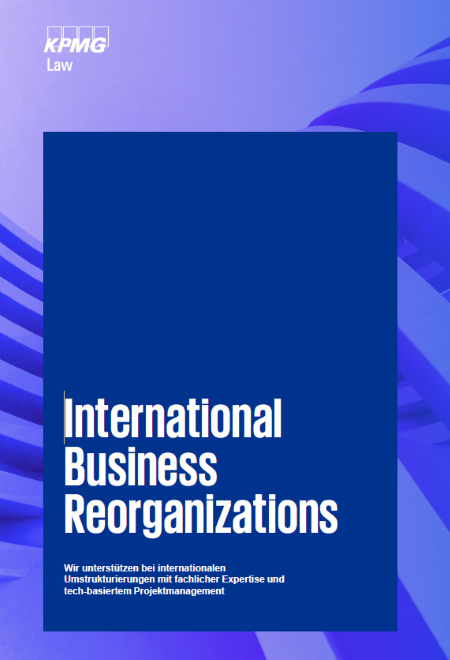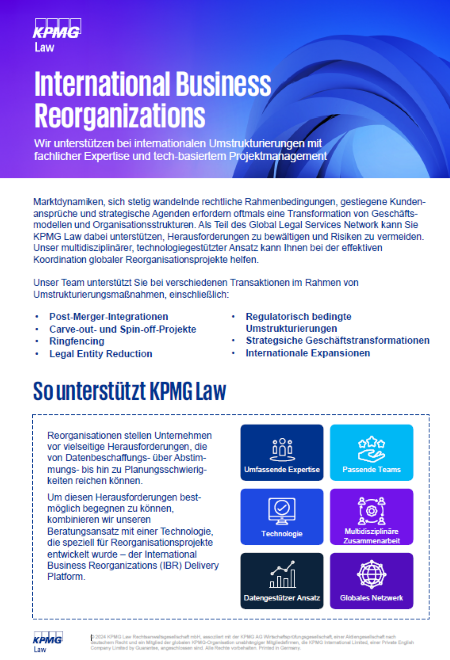

Sometimes companies or parts of them no longer function as planned. There are many reasons for this. Financial problems, market changes or strategic considerations are frequent triggers. The decision to shut down, relocate, sell or transform a part of a company is a complex one. It requires a comprehensive view and expertise in a wide range of specialist areas. These include
Solutions can only be found through interaction between the various disciplines. A wind-down project usually runs for a long time. And implementation requires reliable and efficient project management.
Project management is a decisive factor when winding up a part of a company that is no longer profitable or strategically unsuitable. This is because many disciplines, processors and decision-makers come together in such projects. We manage this with professional project managers and our IBR tool developed specifically for such projects as a single source of truth. Only if all aspects are given sufficient consideration and timelines and budgets are adhered to can the project lead to long-term success.
Rising energy prices, new trade barriers and structural changes pose significant challenges for companies. The experts from KPMG Law and KPMG discuss in a webcast series what options companies have to position themselves for the future.
The first webcast focused on the possibility of relocating, closing or downsizing business units (keyword “winddown”) and discussed strategic aspects of restructuring and the legal framework, planning and implementation of necessary personnel adjustments, the use of data analytics for well-founded decisions and voluntary programs and transfer companies in practice.
Voluntary programs and transfer companies in practice.
The second webcast focused on the possibility of carve-outs and sales of business units and discussed the strategic background of a carve-out, guiding principles and carve-out concept, carve-out vs. wind-down, carve-out financials, planning and implementation of the actual carve-out, integration with the sales process and provisions in the company purchase agreement.
In the third webcast, the transformation of business areas was discussed, focusing on current drivers of strategic transformations, requirements for obtaining funding and the role of state funding in transformation, economic evaluation with practical calculation approaches and operational challenges and strategic fields of action for companies.
Whether partial downsizing, relocation or complete closure – the orderly withdrawal from company divisions requires forward-looking planning, legal diligence and tax sensitivity.
Companies are sometimes faced with the challenge that certain areas no longer function as planned – whether due to financial bottlenecks, changes in the market environment or strategic realignments. In such situations, decision-makers are faced with the complex question: should the division be transformed, sold or closed?
Selling a part of a company is like performing surgery on a living heart. The clean and data protection-compliant allocation of data is a particular challenge. If companies do not take care of this at an early stage, it can delay or complicate the carve-out or even jeopardize the continued success of the target. Dr. Jyn Schultze-Melling, Partner at KPMG Law Rechtsanwaltsgesellschaft mbH and Markus Limbach, Partner at KPMG AG Wirtschaftsprüfungsgesellschaft, explain how companies should proceed.
If company buyers and sellers are unable to agree on a purchase price, earn-out agreements have recently been used more frequently. They stipulate that at least part of the purchase price is dependent on the performance of the target company after the acquisition. But does this always make sense? Dr. Daniel Kaut, Partner at KPMG Law Rechtsanwaltsgesellschaft mbH, and Christin Müller, Partner at KPMG AG Wirtschaftsprüfungsgesellschaft, explain in a joint podcast when the contracting parties should resort to earn-out clauses and what needs to be considered.
Rising interest rates, the recession and possibly stricter regulations are creating a clear trend: more and more parts of companies are up for sale. Regardless of the reason why companies are divesting individual divisions, a carve-out process can be very challenging. Maximiliane Prüm, Partner at KPMG Law Rechtsanwaltschaft mbH, and Dr. Florian Jung, Partner at KPMG AG Wirtschaftsprüfungsgesellschaft, explain what buyers and sellers should think about in their joint podcast.
We have decades of experience in winddown projects and have developed best practices. Nevertheless, the goal is not a one-size-fits-all approach, but a solution that is tailored to your individual needs. Contact us.

We support international reorganizations with technical expertise and tech-based project management

We support international restructurings with technical expertise and tech-based project management

Partner
Site Manager Nuremberg
Cluster Lead Corporate/M&A
Bahnhofstraße 30
90402 Nürnberg
Tel.: +49 911 800929944
chensel1@kpmg-law.com

Partner
THE SQUAIRE Am Flughafen
60549 Frankfurt am Main
Tel.: 49 69 951195565
mtrayer@kpmg-law.com

Partner, Performance & Strategy
KPMG AG Wirtschaftsprüfungsgesellschaft

Partner, Performance & Strategy
* KPMG AG Wirtschaftsprüfungsgesellschaft
© 2026 KPMG Law Rechtsanwaltsgesellschaft mbH, associated with KPMG AG Wirtschaftsprüfungsgesellschaft, a public limited company under German law and a member of the global KPMG organisation of independent member firms affiliated with KPMG International Limited, a Private English Company Limited by Guarantee. All rights reserved. For more details on the structure of KPMG’s global organisation, please visit https://home.kpmg/governance.
KPMG International does not provide services to clients. No member firm is authorised to bind or contract KPMG International or any other member firm to any third party, just as KPMG International is not authorised to bind or contract any other member firm.